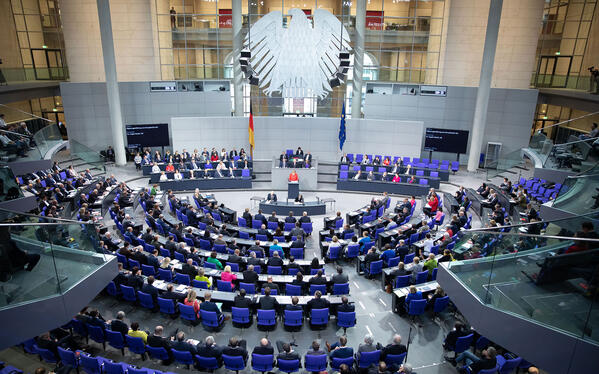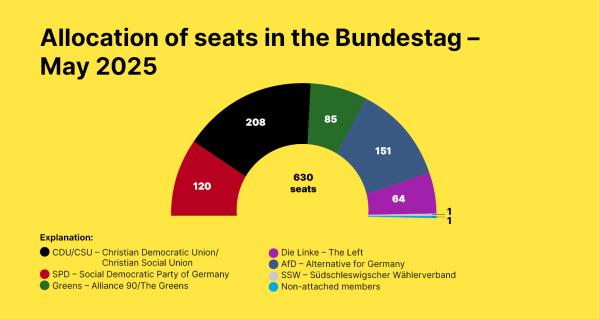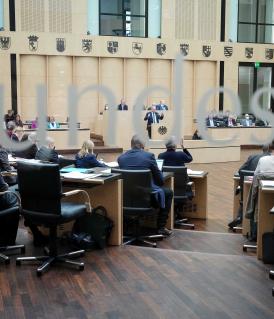Parliament and parties in Germany

How is the German Bundestag elected?
The German Bundestag, which is the country’s parliament, is elected every four years by free, secret and direct ballot by citizens aged 18 and over who are eligible to vote. The 630 members of the Bundestag The Bundestag The Bundestag is made up of the elected representatives of the German people. In principle elections to the Bundestag are proportionally representative, with each party’s share of the vote in the election reflecting the number of seats it occupies in the parliament. But the electoral system also… Read more › are elected according to second votes from parties’ state lists and on the basis of first votes cast for individuals in 299 constituencies.
An amendment to the electoral law for the 2025 Bundestag election has reduced the individual vote element and increased the list vote element. Of the 630 seats, direct mandates will only be allocated in the 299 constituencies if the seats are covered by the proportion of second votes the party has achieved. Previously, what are known as “balance seats” and “overhang seats” had meant that the number of MPs had been significantly higher of late. There were 733 MPs in the 20th Bundestag. The electoral reform has ensured that the parliament will become smaller again.

The role of the parties
The electoral system makes it difficult for any single party to form a government on its own, which is why coalitions of at least two parties are the norm in Germany.
To prevent the party landscape from becoming fragmented, which would make the process of forming a government in the Bundestag The Bundestag The Bundestag is made up of the elected representatives of the German people. In principle elections to the Bundestag are proportionally representative, with each party’s share of the vote in the election reflecting the number of seats it occupies in the parliament. But the electoral system also… Read more › more complicated, parties must receive at least five percent of the votes (five-percent hurdle) in order to obtain seats in the parliament.
Political parties Political parties According to the Basic Law it is the task of the political parties to participate in political will formation by the people. As such, putting forward candidates for political office and the organization of election campaigns both have the status of constitutional tasks. For this reason the parties… Read more › have an extremely important role to play in Germany. They help shape the political decision-making process and are indispensable for democratic elections Elections Every four years, the parties stand in the general elections to the Bundestag. Traditionally, the turn-out is high in Germany, and following a high in the 1970s, when the turn-out was over 90 percent, since reunification it has been around 80 percent. 76.6 per cent of eligible voters took part… Read more › . The Basic Law The Basic Law The Basic Law determines that Germany is a constitutional state: All state authorities are subject to judicial control. Section 1 of the Basic Law is of particular relevance. It stipulates that respect for human dignity is the most important aspect of the constitution: “Human dignity shall be… Read more › therefore accords them constitutional status in Germany. If a party seeks to eliminate the free democratic basic order of the Federal Republic, the Federal Constitutional Court The Federal Constitutional Court The Federal Constitutional Court is a characteristic institution of post-war German democracy. The Basic Law accorded it the right to repeal legislation passed as part of the legitimate democratic process should it come to the conclusion that such legislation contravenes the Basic Law. The… Read more › may ban that party. However, the barriers to this are very high.
Following the election on 23 February 2025, the 21st German Bundestag is made up of six parties and 630 members: the Social Democratic Party of Germany (SPD), the Christian-Democratic Union of Germany (CDU)/Christian-Social Union in Bavaria Bavaria The “beer state” of Bavaria also produces fine wine in the Franconia region. The Oktoberfest, Neuschwanstein Castle and the magnificent Alpine scenery attract more foreign tourists than does any other federal state. Yet the slogan “Laptop and Lederhose” demonstrates that there is more to Bavaria… Read more › (CSU), Alliance 90/The Greens, The Left and the Alternative for Germany (AfD). Since the first Bundestag election in 1949, the CDU, which runs in all of Germany’s federal states Federal states Germany is a federal state. Both the central federal government and the 16 federal states have independent areas of jurisdiction. The government in Berlin is responsible for foreign policy, European policy, defense, justice, employment, social affairs, tax and health. The federal states are… Read more › apart from Bavaria, and its sister party the CSU, which runs only in Bavaria, have formed a joint parliamentary group in the Bundestag The Bundestag The Bundestag is made up of the elected representatives of the German people. In principle elections to the Bundestag are proportionally representative, with each party’s share of the vote in the election reflecting the number of seats it occupies in the parliament. But the electoral system also… Read more › . One seat is reserved for the South Schleswig Voters’ Association SSW, the party that represents the Danish minority in northern Germany.


